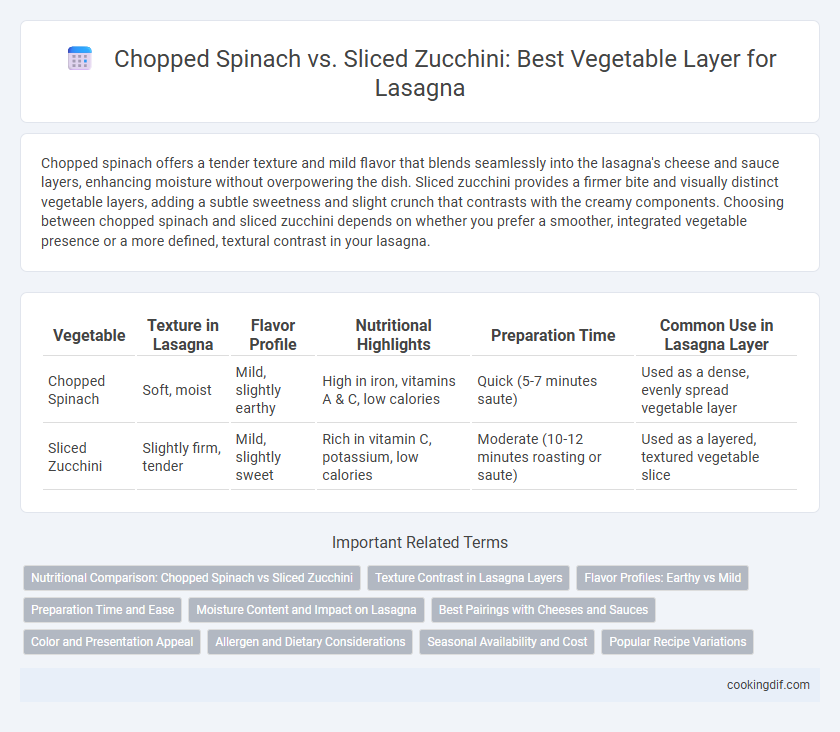Chopped spinach offers a tender texture and mild flavor that blends seamlessly into the lasagna's cheese and sauce layers, enhancing moisture without overpowering the dish. Sliced zucchini provides a firmer bite and visually distinct vegetable layers, adding a subtle sweetness and slight crunch that contrasts with the creamy components. Choosing between chopped spinach and sliced zucchini depends on whether you prefer a smoother, integrated vegetable presence or a more defined, textural contrast in your lasagna.
Table of Comparison
| Vegetable | Texture in Lasagna | Flavor Profile | Nutritional Highlights | Preparation Time | Common Use in Lasagna Layer |
|---|---|---|---|---|---|
| Chopped Spinach | Soft, moist | Mild, slightly earthy | High in iron, vitamins A & C, low calories | Quick (5-7 minutes saute) | Used as a dense, evenly spread vegetable layer |
| Sliced Zucchini | Slightly firm, tender | Mild, slightly sweet | Rich in vitamin C, potassium, low calories | Moderate (10-12 minutes roasting or saute) | Used as a layered, textured vegetable slice |
Nutritional Comparison: Chopped Spinach vs Sliced Zucchini
Chopped spinach contains higher levels of iron, calcium, and vitamins A and K compared to sliced zucchini, making it a nutrient-dense choice for the vegetable layer in lasagna. Sliced zucchini offers fewer calories and carbohydrates, contributing a lighter texture and mild flavor while providing a good source of vitamin C and antioxidants. Incorporating chopped spinach enhances the dish's nutritional profile with essential minerals and vitamins, whereas sliced zucchini benefits those seeking a lower-calorie, hydrating ingredient.
Texture Contrast in Lasagna Layers
Chopped spinach provides a soft, delicate texture that blends seamlessly into lasagna layers, creating a smooth, uniform mouthfeel. Sliced zucchini adds a firmer, slightly crunchy contrast, offering distinct layers and a more varied bite. Combining both vegetables enhances texture complexity, balancing softness with subtle crispness for an engaging lasagna experience.
Flavor Profiles: Earthy vs Mild
Chopped spinach adds an earthy, slightly bitter flavor to the vegetable layer in lasagna, enhancing its depth and richness. Sliced zucchini provides a mild, subtly sweet taste with a tender texture that balances well with robust sauces. Choosing between spinach and zucchini influences the overall flavor complexity, making spinach ideal for a bold, hearty profile and zucchini better suited for a light, delicate dish.
Preparation Time and Ease
Chopped spinach requires minimal preparation time since it cooks quickly and softens easily, making it ideal for a fast vegetable layer in lasagna. Sliced zucchini demands more time for proper sauteing or roasting to avoid excess moisture and ensure tenderness, which can extend prep duration. Spinach's ease of use and rapid wilting provide a simpler, more efficient option compared to the slightly more involved preparation process for zucchini slices.
Moisture Content and Impact on Lasagna
Chopped spinach releases significantly more moisture than sliced zucchini, which can cause lasagna layers to become soggy and affect the texture. Sliced zucchini, with its firmer structure and lower water content, provides a balanced moisture level, maintaining the integrity of each lasagna layer. Managing the vegetable's moisture content is crucial to achieving a perfectly baked lasagna with distinct, well-defined layers.
Best Pairings with Cheeses and Sauces
Chopped spinach pairs exceptionally well with ricotta and mozzarella, absorbing tomato-based marinara sauce to create a creamy, flavorful vegetable layer. Sliced zucchini complements bechamel sauce and Parmesan cheese, offering a tender texture that balances the richness of the creamy white sauce. Both vegetables enhance the lasagna's layers, but spinach offers a more robust pairing with acidic tomato sauces, while zucchini shines with delicate, creamy cheeses.
Color and Presentation Appeal
Chopped spinach offers a vibrant, deep green hue that creates a visually rich vegetable layer in lasagna, enhancing both color density and texture contrast. Sliced zucchini provides a lighter, translucent green tone, introducing a fresh and crisp appearance with defined, subtle ridges that add dimensionality to the presentation. Choosing between chopped spinach and sliced zucchini directly influences the lasagna's aesthetic appeal, balancing boldness and brightness in the vegetable layer.
Allergen and Dietary Considerations
Chopped spinach offers a nutrient-rich, allergen-friendly option ideal for lactose-free and gluten-free diets, providing essential vitamins A and K without common allergens. Sliced zucchini presents a low-calorie, hypoallergenic alternative that is suitable for paleo, vegan, and keto diets, contributing hydration and mild flavor to the vegetable layer. Both vegetables accommodate diverse dietary needs but differ in texture and moisture content, influencing the overall lasagna consistency.
Seasonal Availability and Cost
Chopped spinach is widely available year-round at a low cost, making it an economical choice for lasagna vegetable layers during all seasons. Sliced zucchini is typically more abundant and cost-effective in summer and early fall, while prices tend to rise in off-season months due to limited supply. Choosing between these vegetables for a lasagna layer depends on balancing seasonal availability with budget considerations, where spinach offers consistent affordability, and zucchini delivers peak freshness and flavor seasonally.
Popular Recipe Variations
Chopped spinach provides a tender, nutrient-rich layer packed with iron and vitamins, making it a popular choice for traditional lasagna recipes. Sliced zucchini offers a lighter, slightly crunchy texture and lower calorie content, favored in modern, health-conscious variations. Both vegetables enhance flavor profiles and nutritional value, catering to diverse dietary preferences in lasagna preparation.
Chopped spinach vs Sliced zucchini for vegetable layer Infographic

 cookingdif.com
cookingdif.com